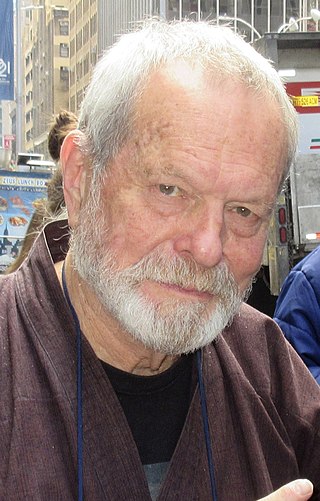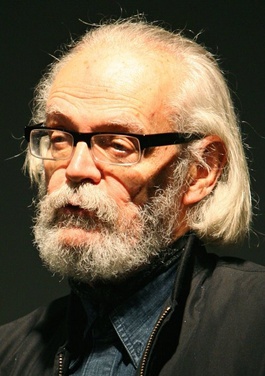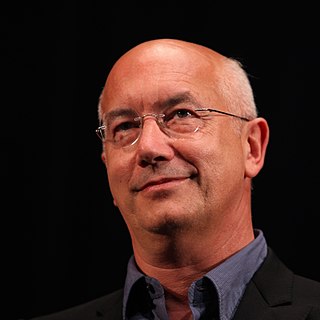
Miguel de Cervantes Saavedra was an Early Modern Spanish writer widely regarded as the greatest writer in the Spanish language and one of the world's pre-eminent novelists. He is best known for his novel Don Quixote, a work often cited as both the first modern novel and "the first great novel of world literature". A 2002 poll of 100 well-known authors voted it the "most meaningful book of all time", from among the "best and most central works in world literature".

Terrence Vance Gilliam is an American–born British filmmaker, comedian, collage animator and actor. He gained stardom as a member of the Monty Python comedy troupe alongside John Cleese, Eric Idle, Michael Palin, Terry Jones, and Graham Chapman. Together they collaborated on the sketch series Monty Python's Flying Circus (1969–1974) and the films Monty Python and the Holy Grail, Life of Brian (1979) and The Meaning of Life (1983). In 1988, they received the BAFTA Award for Outstanding British Contribution to Cinema. In 2009, Gilliam received the BAFTA Fellowship for lifetime achievement.

Sergei Fyodorovich BondarchukГСТ HaCCP was a Soviet and Russian actor and filmmaker of Ukrainian origin, who was one of the leading figures of Russian cinema in the 1950s, 1960s and 1970s. He is known for his sweeping period dramas, including War and Peace (1965–67), his internationally acclaimed four-part film adaptation of Leo Tolstoy's novel, and for Waterloo (1970) a Napoleonic War epic.

Priit Pärn is an Estonian cartoonist and animation director whose films have enjoyed success among critics as well as the public at various film festivals.

The Man Who Killed Don Quixote is a 2018 adventure-comedy film directed by Terry Gilliam and written by Gilliam and Tony Grisoni, loosely based on the 1605/1615 novel Don Quixote by Miguel de Cervantes. Gilliam tried to make the film many times over 29 years, which made it an infamous example of development hell.

Luis García-Berlanga MartíMMT was a Spanish film director and screenwriter. Acclaimed as a pioneer of modern Spanish cinema, his films are marked by social satire and acerbic critiques of Spanish culture under the Francoist dictatorship. These include Welcome Mr. Marshall! (1953), which won the International Prize at the 1953 Cannes Film Festival, Plácido (1961), nominated for an Academy Award for Best Foreign Language Film in 1962, and The Executioner (1963), winner of the FIPRESCI Prize at the 24th Venice International Film Festival

The cinema of Croatia has a somewhat shorter tradition than what is common for other Central European countries: the serious beginning of Croatian cinema starts with the rise of the Yugoslavian film industry in the 1940s. Three Croatian feature films were nominated for the Academy Award for Best Foreign Language Film, several of them gained awards at major festivals, and the Croatian contribution in the field of animation is particularly important.
The San Francisco International Film Festival, organized by the San Francisco Film Society, is held each spring for two weeks, presenting around 200 films from over 50 countries. The festival highlights current trends in international film and video production with an emphasis on work that has not yet secured U.S. distribution. In 2009, it served around 82,000 patrons, with screenings held in San Francisco and Berkeley.

Iran's annual Fajr International Film Festival, or Fajr Film Festival, has been held every February in Tehran since 1983.The festival is supervised by the Ministry of Culture and Islamic Guidance. It takes place on the anniversary of the 1979 Islamic Revolution. The awards are the Iranian equivalent to the American Academy Awards.

Göteborg Film Festival (GFF), formerly Göteborg International Film Festival (GIFF), known in English as the Gothenburg Film Festival, formerly Gothenburg International Film Festival, is an annual film festival in Gothenburg, Sweden and the largest film event in Scandinavia. When it was launched on February 8, 1979, it showed 17 films on 3 screens and had 3,000 visitors.
Vladislav "Vlado" Kristl was a filmmaker and artist, best known for his animations and short films.

Carlos Yunior Acosta Quesada is a Cuban-British ballet director and retired dancer who is director of the Birmingham Royal Ballet. He danced with many companies including the English National Ballet, National Ballet of Cuba, Houston Ballet and American Ballet Theatre. He was a permanent member of The Royal Ballet from 1998 to 2015. In 2003, he was promoted to principal guest artist, a rank which reduced his commitment, enabling him to concentrate on a growing schedule of international guest appearances and tours. He celebrated his farewell after 17 years at The Royal Ballet, dancing his last performance in November 2015 in Carmen, which he both choreographed and starred in.

Viengsay Valdés is a Cuban ballerina. Since 2003, Valdés is the Prima ballerina and since 2019 she is the Artistic Director of the National Ballet of Cuba.

The Berlin International Film Festival, usually called the Berlinale, is a major international film festival held annually in Berlin, Germany. Founded in 1951 and originally run in June, the festival has been held every February since 1978 and is one of Europe's "Big Three" film festivals alongside the Venice Film Festival held in Italy and the Cannes Film Festival held in France. Furthermore, it is one of the "Big Five", the most prestigious film festivals in the world. The festival regularly draws tens of thousands of visitors each year.
Don Quixote is an unfinished film project written, co-produced and directed by Orson Welles. Principal photography took place between 1957 and 1969. Test footage was filmed as early as 1955, second-unit photography was done as late as 1972, and Welles was working on the film intermittently until his death in 1985. The film was eventually edited by Jesús Franco and was released in 1992, to mixed reviews.

Vatroslav Mimica was a Croatian film director and screenwriter.

Blacknorth is an animation and visual effects (VFX) studio based in Belfast, Northern Ireland. It was founded in 2009 by Kris Kelly and Evelyn McGrath, with the latter leaving in 2013.

Davide Ferrario is an Italian film director, screenwriter and author.
Uglješa Šajtinac is a Serbian writer and playwright.















